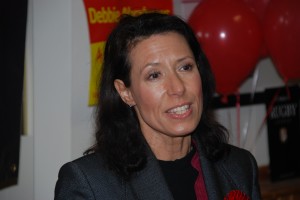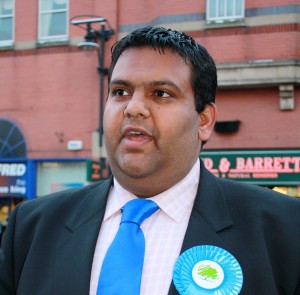The Great Party Political Issue Of Our Time – Why Is The Chip Shop Not Open More?
by Emily Burgin, 19, Delph
Politics – what’s that got to do with me? I’m 19 years old and friendships, college, partying, fashion, boys and earning a bit of money are the issues that concern me and my friends when we are together. To be honest, if it wasn’t for the fact that I live in Saddleworth and we are all suffering from by-election overload, that would still be the case. But when one of my friends said to me “who is this Phil Woolas person anyway?” it got me thinking.
I’ve got a vote. I have a say in the government of this country and I haven’t got a clue. I voted once but if I’m honest I probably wouldn’t bother again, as what’s the point? It didn’t make any difference to anything anyway. Not surprisingly, when I asked my friends on Facebook what they would like to ask our politicians I got a few “are you being serious?” and a load of rude and silly comments, including “Ask them why the chip shop isn’t open more?” And I sort of understand that disinterest.
But all the news around the increase in tuition fees has changed that for me. I am planning to go to university this year and for the first time I am keenly aware that politics does affect me and what I can and can’t do. But what does that mean when it comes to voting on 13 January? I’m damned if I know, so I set off to find out.
I wanted to know what they would do for younger people in this area, where their parties stood on the particular issue of tuition fees and the scrapping of the Educational Maintenance Allowance which is something some of my friends have, and also what the key challenges were going to be for young people in the next few years and how they would help us deal with them.
I met Debbie Abrahams first, the Labour candidate for the Oldham East and Saddleworth seat. Debbie had a lot to say about the importance of facilities and services for young people. She said: “I’m very keen that we should be able to do something about sports and leisure facilities and I’ll work very hard with young people to do that”. Good point I thought, but a bit vague.
Debbie reminded me about the previous Labour government’s promises around jobs, education and training for 16-18 year olds and particularly apprenticeships. She said: “I met with many young people who felt that this was a lifeline if they didn’t want to go to university.” With the university fees going up, I think apprenticeships are important so this sounded like a valid point to me.
Debbie was also keen to say how she and the Labour party are absolutely against the proposals for raising tuition fees and scrapping EMA payments. She said: “It is just not fair and this is what we are campaigning on – fairness.” She also said: “Kids are telling us this is going to affect actually getting into college, so it is going to put people off staying on in education.”
From my experience the EMA was an incentive for some young people to go to college and stay in education, but I am not sure it’s the difference between going and not going and £100 bonus at Christmas seemed a bit unfair to those of us who didn’t get anything.
Debbie also made the point that “there should be a broad spectrum of opportunities available for young people whether they want to go the academic route or if they want to go the vocational route of training and we want to see that across the spectrum of disciplines as well. What we are finding now is that certain courses are being cut because they are deemed as not acceptable by this government and it is absolutely not right.” This hit home because I am doing some of these very courses she was talking about.
When talking about challenges for young people in the next few years Debbie said: “It’s going to be tough,” all the more reason she said “for young people to send a strong message back to this government that it is not acceptable, promising one thing and doing another is not on.” It’s a nice idea but in practice, my friends don’t think the government will actually listen to people my age so it’s not likely to happen, although I suppose Debbie is listening to me.
Next up, I met Kashif Ali, the Conservative candidate for Oldham East and Saddleworth. When asked about what he had to offer younger people, he gave me a good answer in terms of giving a number of examples of what he is doing, not just what he wants to do. He said: “I know the recession hit younger people badly so this is something we are looking at and getting jobs for young people is particularly important. For example, three years ago, we set up a campaign for a cinema in Oldham as we are the biggest town in Britain without a cinema complex.”
He went on to say how a cinema complex would bring in hundreds of new jobs; part time or shift work for younger people as well as giving younger people something to do in Oldham that wasn’t alcohol orientated. I liked this answer because it made common sense.
When asked to justify the Conservative decision to increase tuition fees he said: “Labour introduced tuition fees when we there wasn’t the public finance problems we have now.” He continued: “In an ideal world if we could offer free education, we should. But the reality is because of the number of people going into higher education and because the British taxpayer isn’t happy about paying more taxes, a balance has to be reached and fees have to be paid.”
Kashif also said that the £9000 figure is a bit misleading for most students. Most universities would be asking for £4-5000 and you would only start to pay this back once you earn more than £21000 a year. With regard to the EMA scheme, he said that the money has not been taken out of the education system altogether and that they want to use the money to introduce a pupil premium for children at primary school level from the most deprived backgrounds: “There is evidence out there which suggests although the EMA plays a huge role in people’s lives, that it wouldn’t stop people from going to sixth form and being in sixth form.” That rang true with me because it fits with my experience.
When talking about the challenges for young people over the next few years, Kashif re-emphasised the importance of regeneration and creating jobs and also mentioned practical issues connected to employment such as the need for more accessible public transport to help young people travel for work and education. He was the only candidate to focus on the impact of crime, anti-social behaviour, drug dealing and shootings on young people, and mentioned the Conservatives’ policy for Elected Police Commissioners which he felt would help get the police involved to a greater extent. I agree this is an important issue and not one mentioned by the other two candidates.
Last but not least I met Elwyn Watkins, the Liberal Democrat candidate for Oldham East and Saddleworth. Creating jobs for young people is an issue close to Elwyn’s heart as he has a background in manufacturing and has been directly involved in creating jobs for many years. He said: “Lots of people have talked about creating jobs, but if you’ve actually never done it yourself in your own professional life, how can you be an expert and know how to do it?”
He sees bringing jobs into the area, particularly those in the manufacturing industry, as one of the best ways of supporting young people. I understand what he is saying as I know how important my part-time job at the Co-op is to me and my independence.
I was keen to get an answer to the tuition fee issue, in the light of the Liberal Democrats’ u-turn on the pre-election promise to abolish fees and Elwyn’s support for the coalition’s proposal to increase fees. Mr Watkins said he would have voted for the rise in tuition fees if he had been an MP at the time of vote. He said: “I’m not an abstainer. I think that’s a cop out. I’m either going to be going yes or no. For the sake of the government and the sake of the coalition I would have voted in favour.”
However, he went on to say “if we were elected outright we would have abolished tuition fees but we are in a coalition and so we have to compromise.” He stressed that in the current financial situation, “We have to make savings somewhere. Students will not have to pay anything up front and will pay the money back when they earn over a certain amount. Someone earning £30,000 a year would pay back £60 a month. Some people will never have to pay back a penny.”
He said: “I think each generation should pay for the next generation’s education. So I should pay for your tuition fees and you should pay for the next generation’s tuition fees.” I respect his loyalty to his party, however, it is still a massive change in the promises they made and it’s difficult not to feel betrayed. However, when he said: “I still think that students get a raw deal, and if I’m an MP I’m still going to fight for that,” I could see how difficult it is to satisfy everybody.
Having interviewed all three candidates I thought it would help me make up my mind who to vote for. However, confusingly I found all the candidates made generally good points. I was impressed when specific examples were used and I heard about actions actually already taken as well as ideas and plans. I warmed to some individuals more than others as people, but do I make my decision based on personality or based on their views, and how much can I believe anyway?
I guess these are the questions every voter struggles with. But what I can say as a result of this experience is my voting decision will be more informed than ever before, and I will be voting on Thursday.
(Editor’s note: Many thanks to Emily for writing this article. You can get full coverage of the by-election so far from Saddleworth News by clicking here)






Congratulations to Emily for such a well written and informative article, it’s nice to know that open minded people like this are the future of this country – well done on your efforts and results of looking into important issues and sharing them.
I’m sure there will be some that would jump on this article and accuse you of only looking at 3 of the 10 candidates – before they do I’d point out – that this is a 19 year old young lady who has chosen to share the view of three candidates she’s been lucky enough to meet with.
I’ve tried myself to get responses from all of the candidates on some matters that I believe are important to me, and been less successful than Emily in some cases.
I think it’s absolutely right not just to take the information that’s delivered to us by the parties, but instead to actively go out there and challenge them to find out answers to questions that are important to you.
Well done for your efforts and for sharing your results – thank you!
Nice piece, I hope more younger voters are encouraged to care and to vote. Although, I think there’s an elephant in the room here. “Having interviewed all three candidates”. There are 10. Personally, I’m fed up of voting for the ‘least worst’ of two front-runners because otherwise my vote won’t count. I want to be able to vote for who I think has the best policies and for all votes to be reflected in the prevailing power structures. That seems more like ‘fairness’ to me. How do I vote to get a real choice?
Sorry, I really wasn’t trying to take anything away from your piece at all Emily, which is, as Nick rightly points out, well researched, well-balanced and well written. I just have a bee in my bonnet at the moment whilst ‘deciding’ who to vote for 🙂
A very well written article Emily, and cracking headline – which brought me here from the Twitter link.
@Fed Up Voter,
that all comes down to the electoral system, and there’s a referendum coming up on that in May. If you vote for AV, in future elections you can pick your 1st choice as your 1st choice, but also know that if they don’t win, you can also put down your 2nd, 3rd etc. choice, and make sure your voice will be heard.
In this election, you should pick the party who have stood for reforming elections ever since they were formed. They’re called the Liberal Democrats 🙂
Really nice piece, well done. And nice to hear from an intelligent open-minded person. I’m sure that part of the problem with the situation in which the country finds itself is the narrow-minded ‘always have voted for (insert party here) and always will’ voting mentality. Whoever wins on Thursday – won’t be perfect by any means but as long as people *think* about who to vote for, we’re taking a step forward. With the obvious exception, of course – hate has no place in this constituency or this country.
Thank you all for your kind and constructive comments. I really enjoyed writing the piece and it’s exciting to have an article published! 🙂
I enjoyed your article Emily. With respect to EMAs, a report by CfBT has shown that there is robust evidence that they have increased participation by 16 and 17 year olds and contributed to motivation and performance. A key issue is that they are used by young people to cover their travel costs, especially where attendance is at college rather than a local school sixth form school, and buy books. They are also very well targeted at low income families. The evidence shows they have been very successful overall in raising participation.
@learningfirst.
The National Foundation for Educational Research found that 88% of pupils receiving the EMA would stay on in Education without it.
Wouldn’t it be better to have a smaller, more targeted fund to help those young people who actually need assistance with transport and other costs? That would be better than giving money away to a whole load of additional students who don’t really need it and who would carry on in school regardless.
Emily, this is a very well-written piece – you’ve a great future as a reporter!
@ HG
The findings of NFER’s survey has been refuted for a number of reasons:
– it was conducted amongst year 10 and 11 learners so not representative of all learners who receive EMAs
– it is unclear if it represents learners in the full extent of FE provision
and not merely schools
Other research put the ‘deadweight’ of EMAs at a much lower percentage (36%) than NFER’s research.
The respected Institute for Fiscal Studies shows in its research that EMAs increased participation by 7.3%. At a time of increasing travel costs, especially for young people in rural area, EMAs will become more vital. At the moment they are pretty well targeted, with young people from families in the bottom 30% of household income receiving them.
It may be possible to target EMAs more finely but using one survey (NFER’s) on which to base policy especially when it may not be statistically valid, is worrying.